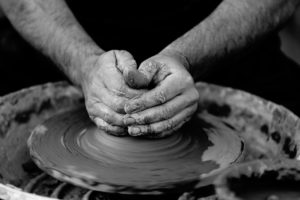I’m in the middle of a conversation with a friend, who is a writer, about “good” and “bad.” Good and bad what, you ask? Good and bad writing. Good and bad singing. Good and bad cooking.

The subject caught my attention because it evokes strong feelings, but I’ve been struggling for several days now to begin exploring it in writing with any kind of coherence. It seems ridiculously complicated, which is interesting and makes me even more determined to tackle it.
Sometimes the only thing I can do is start peeling the onion and see what happens, so here goes.
“Good” and “bad” are subjective descriptors. According to Oxford Online Dictionary, good is variously defined as “to be desired or approved of,” and “giving pleasure, enjoyable or satisfying.” Bad is “of poor quality or a low standard,” “not such as to be hoped for or desired; unpleasant or unwelcome.”
It seems to me “good” and “bad” are like “success.” Either we retain our power and define them for ourselves, in spite of external pressure, expectations, criticism or judgment, or we allow others to tell us what “good” and “bad” are. In the case of creative expression, like writing, singing and cooking, it’s impossible to please all the people all the time. Sometimes it’s impossible to please anyone.
Is that a goal of an artist, to please others? Certainly, up to a point. If I can’t interest an agent in my writing, it’s unlikely I’ll be published. If my writing is not deemed marketable, no agent will take me on.
Is marketable the same as “good?” Is popular the same as “good?”

Emphatically, no. I’ve read bestsellers I thought were trash. I’m absolutely certain great writing exists that will never be discovered by the world. Some of my favorite authors are heavily criticized as being poor writers.
It seems to me “good” and “bad” boil down to opinion or preference. It might be an educated opinion, a well-respected opinion, or just a I-know-nothing-about-art-but-I-know-what-I-like opinion, but an opinion, even a majority opinion, is not a universal law.
Creative artists work from a mix of skills and inspiration. Some artists have the resources and access to become formally trained in the use of writing skills, musical skills or culinary skills, especially if they recognize their interest and/or aptitude for a particular artistic expression early in their lives.

Many others, including myself, may lack the resources, access or interest in such formal education and training, or may come to their art later in life. These artists are frequently autodidacts (self-taught people) who simply practice their art, whatever it is, because they must. Their creations may or may not be as refined and elegant as those who obtain years of education and training, but they feel a passion or obsession for artistic expression that won’t be denied.
This mix of skill and inspiration is part of what makes the whole issue of “good” and “bad” so complicated. Skill is the ability to do something well. The definition implies someone decides what doing well means. Who decides that? Am I in charge of that, as the reader, concert-goer or diner, or are the writer, singer and chef the ones who define their artistic expression as well done?
As we create art, what are we focused on? Do we want to earn a living? Are we focused on competition — do we want to be number one? Are we determined to be famous? Rich? Successful? Influential? Professional? Validated? Perhaps, on the other hand, we have no expectation of living by our art, but artistic expression is a private joy, a sacred healing, an exercise in authenticity that keeps us rooted and grounded. Art is our prayer, our act of gratitude and hope, an expression of love for those around us, our love letter to life.

As we consume art (read, listen, eat), what are we focused on? Perhaps we are collectors who are intent on investment and monetary value. Perhaps we love art because it inspires us; opens our hearts, minds and imaginations; or helps us manage our feelings. Maybe we’re avid readers, lovers of music, or lovers of fine cuisine. We may think of ourselves as “professional” or “successful” artists and thus feel qualified to judge and compare the work of others.
Calling a piece of writing, a song or a meal “good” or “bad” strictly in terms of a demonstration of skill, however, leaves out the heart and soul of creativity. Passion, inspiration and obsession cannot be taught. We might enjoy and admire the skill underpinning a technically perfect book or song or meal, but we’re not robots. Compelling art is not made from skill alone.

Art, at its best, breaks us open. It haunts us. It companions us. It provokes, challenges, explores, dares, admits, stuns, shocks, amuses, comforts, excites and enlarges us. “Good” and “bad” are far too unsophisticated and limited to describe the central power of creative expression. The skill of the artist might add to that power, but skill without the animating spirit of passion is merely a well-learned series of maneuvers.
What is art worth? What is the value of joy, of authenticity, of artistic expression reflecting a piece of our soul? Art, for me, is about an expression of human experience, inherently valuable, even sacred, in its truth and vulnerability. I’m not qualified to judge another’s expression of experience. I wouldn’t presume to do so. I wouldn’t dare.
In the end, I can only circle back around to my own power, my own intentions and integrity, and my own limitations. I’m not a formally trained writer. As a creator, I’m compelled to create. I know it’s part of what I’m here to do. It’s humbling and gratifying when others find value in my work, but even when I have no indication of that, I value it.
Writing provides me with a vehicle for managing feelings, deep healing, a bridge for connection, and an irresistible and fascinating personal challenge. How can I increase my skill? What can I learn? How can I become a better writer with every blog post and every page of my manuscript? How can I increase my confidence, courage and authenticity through writing? What’s the best I can contribute?
I don’t frame my creative work as “good” or “bad.” I do think about how to make it better. To that end, I gladly solicit and receive feedback from others, and several people in my life have made huge contributions to my skill, but at the end of the day I consider my own opinion of its value first, and I take neither praise nor criticism personally.
To create art is to be fully present. A piece of art is an invitation to be intimate with the artist and ourselves, an invitation to increase our empathy, respect and compassion, to reach out and clasp the experience of another human being.

I’ve written before about the cultural pressure to make ourselves small in a myriad of ways. How many natural artists (every child) have been criticized, shamed, derided or otherwise amputated from their artistic expression, particularly if it’s in any way sensual? How many people walk around with soul hunger to create poetry; to dance, to make music and sing songs; to be artists, but deny themselves because they don’t think they’re good enough? How many people have made a creative offering or expression and been rejected, mocked or dismissed?
I believe if we want a better, healthier culture, those who want to play with words must play with words, those who want to play with paint must play with paint, every shower must have a singer, every piece of music a dancer, and every instrument an explorer.
Skill matters, depending on the artist’s intention and the audience’s perception. I suppose we can describe our perceptions of skills as “good” or “bad,” although I think we could come up with less subjective standards of measurement and recognize skill level as only a part of artistic expression.
Skill matters, but heart and soul matter more.

© 2019 – 2022, Jenny Rose. All rights reserved.
I always wanted to be an artist. I hung out in the art room at school, hung out with real life artists, soaking up as much of their aesthetic as I could. I did take classes, but always judged my skill as sub-par, the results of my work were frustrating and ended up in the trash bin. I am old now, and that urge is still there. I noodle on, doing crafty stuff, sewing, embroidering, making jewelry, but I finally realized that I am not the kind of artist I wanted to be. My creations will never be hung in a gallery, I refuse to sell anything I make, preferring to gift the best of what I do. I have actually started drawing and painting again, but with the knowledge that what I do is for fun, because I like the process, not that the end result will be skillfully rendered. So is it good? Is it art? Nope. But it is a part of who I am, and that must be good enough.
Thanks for sharing this, Lyn. I’m glad you’ve nurtured your creativity as best you can, and you ARE good enough!